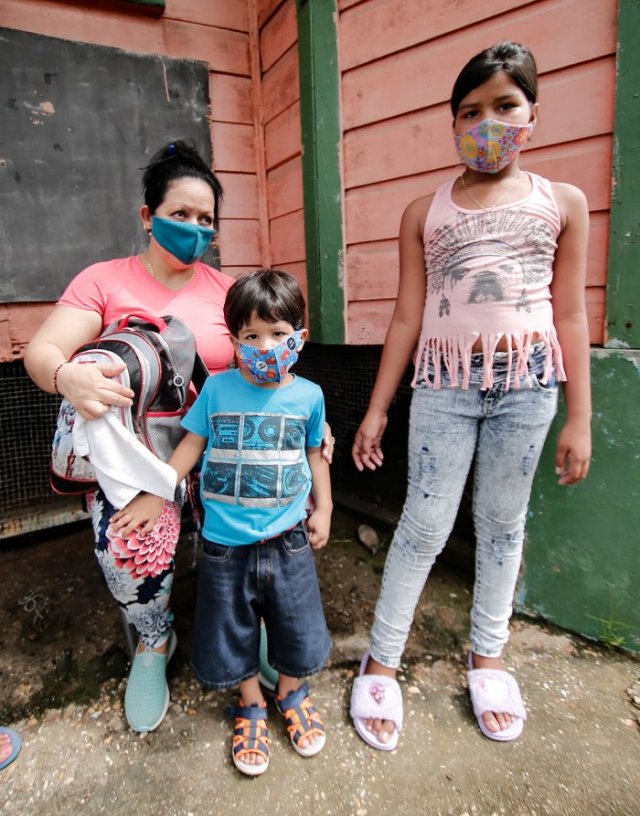
Lucibel Mendoza left Venezuela with her three-year-old son and 80-year-old mother to come to Trinidad and Tobago in early 2020, while her 19-year-old son stayed behind. She settled in Moruga, a village along Trinidad’s southern coastline, promising to earn money to send home and support him. Arriving in Trinidad and Tobago just as COVID-19 began made that promise nearly impossible to keep.
By Reliefweb
“It has been challenging because I haven’t been able to get a steady job, the little that I earn, I send it to him,” Lucibel said.
Like Lucibel, refugees and migrants from Venezuela come to Trinidad and Tobago in the hope of a better life. In 2019, 16,523 Venezuelan migrants registered with the Government and received a Minister’s Permit, which legally allowed them to work for one year. At that time, migrants could find work in the hospitality, entertainment, restaurants, and construction industries.
However, along with the pandemic came the closing of Trinidad and Tobago’s borders and many of the businesses employing migrants. The 2020 Displacement Tracking Matrix Report (DTM) showed that 68 per cent of employed migrants lost their jobs due to COVID-19. Now, many are struggling alongside Trinidad and Tobago nationals to find or keep steady employment. Measures taken to curb the spread of the virus exacerbated their vulnerabilities. Without consistent earnings, migrants can barely afford necessities.
“Migrants are very uneasy at this time,” says Natalie Patrice, founder of the Moruga Poverty Reduction Centre. “As it stands, they are in limbo; between a rock and a hard place. They want to survive and be able to work,” she added.
Rising unemployment among locals and migrants put greater demands on community-based organizations like Patrice’s center to provide relief. She reached out to several agencies, including the International Organization for Migration (IOM), asking for additional aid in her hometown.
Moruga is one of nine rural communities where IOM distributed more than 4,000 hygiene kits – boxes of essential sanitary items like toothpaste, deodorant, and laundry detergent, among other things that help them keep safe during the pandemic.
Lucibel was one of those who came to IOM’s distribution at the Moruga Poverty Reduction Centre to receive a kit.
The response aims to provide short-term relief to vulnerable migrants and host communities, who also benefit from the distribution.
The need for such assistance is on the rise as IOM Port of Spain gets increasing requests for various forms of emergency support from its partners and migrants. Food and access to essentials, including cleaning and hygiene supplies, top the list as the immediate primary needs for vulnerable people. Both locals and migrants alike have been particularly affected by the economic impact of the pandemic in Trinidad and Tobago’s rural and coastal areas like Moruga, Siparia, Penal, Mayaro, Rio Claro, Cedros, and Icacos.
“It is important to take into consideration the needs of Trinidad and Tobago nationals who are also facing a tough situation. Refugees and migrants from Venezuela are experiencing hardships when they arrive. Still, if you only provide for them, you could be fueling xenophobia and making life in their host communities more challenging,” said IOM Port of Spain Head of Office, Jewel Ali.
“You often find migrants who come here and try to live in bigger groups to cover the cost of the rent,” Ali points out. “Then you have overcrowding, which creates protection and health concerns during the pandemic since there is limited ability to self-isolate if someone gets sick. So, we need to come out here and provide them with hygiene kits,” she added.
The distribution events also tackled another challenge for the migrant population, related to the inadequate information about access to public services. Surveys conducted by IOM in 2019 identified a lack of knowledge about labour laws and health services as a critical concern among them. IOM and UN Women used the distribution events to hand out literature that gave migrants contact information on domestic violence shelters, COVID-19 prevention tips, and first responder agencies.
Single mother Judy Sammy was one of the Trinidadians who also came to IOM’s distribution in Mayaro to get a hygiene kit. She has spent years in and out of the hospital with cancer and other ailments, having five operations in quick succession. Her prolonged illness has made it difficult to get a job, so she relies on social support payments to care for her teenage daughter.
“Anytime help comes, I count it as a blessing because my whole life is a blessing,” she said. “I’m always happy when someone can lend a helping hand, and you need it the most, especially in difficult times like these,” Judy added.
IOM’s hygiene kit distribution project was a collaboration with UN Women. NGOs, community-based organizations, faith-based organizations, and schools partnered to identify people in their communities who needed support. The Trinidad and Tobago Coast Guard helped during the distribution by enforcing COVID-19 protocols, including temperature checks, sanitization, and overseeing social distancing at the venues.
IOM Port of Spain continues its work in direct emergency assistance, which also includes temporary accommodation support. Activities surrounding vocational training, livelihood opportunities, and effective integration into host communities are also underway as medium to long-term solutions to address key challenges faced by vulnerable migrants in Trinidad and Tobago.
These activities were made possible with the financial support of the Bureau of Population, Refugees, and Migration (PRM) of the United States Department of State.

